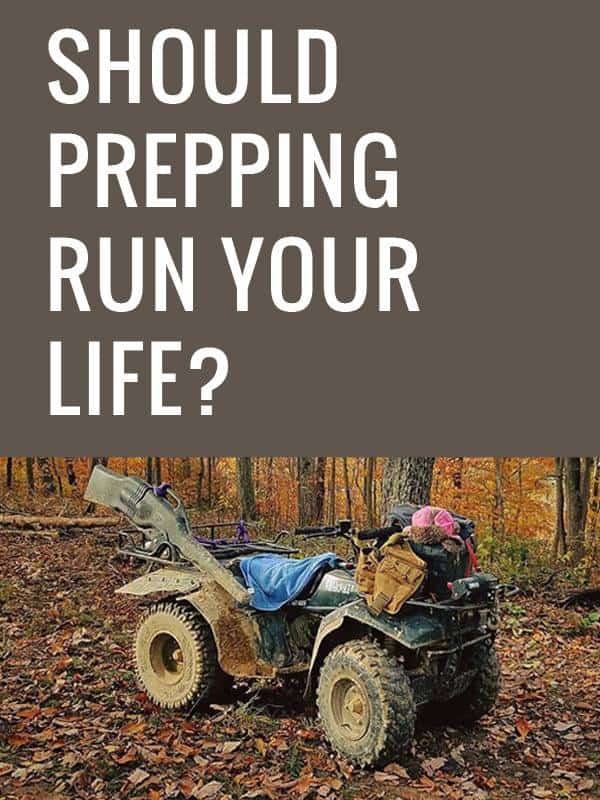Should prepping run your life? The short answer is absolutely yes! Prepping is not a hobby, it is a self-reliant lifestyle choice.
When you fully adopt a preparedness routine and approach the matter as a form of “life assurance” regardless of where you are, doing anything, and feeling confident about being able to survive whatever comes.
Get the image of a fanatic always adorned in tactical gear and too fearful to ever venture more than 50 feet away from his (or her) bunker out of your head. That might be the version of preppers the unprepared think relates to our lifestyle choice, but they couldn’t be “more wrong”.
Think about prepping like farming. The farm “runs” the farmers life. He or she must get up at a certain time everyday, feed the animals, tend to the crops, check fencing, ward off predators, chop wood, build, fix, and repair equipment and storage structures, preserve the harvest, tend to minor injuries and aches and pains himself (or herself) so the necessary manual labor can continue.
If the farmer fails to tend the daily needs of his farm, he will not have the food and shelter he needs to survive. The same can be said for preppers: if you neglect to engage in self-reliance on a daily basis, the skills, tools, supplies, and stockpiles will not be there when you need them.
No, prepping is not a hobby you devote time to only when you can fit it into your schedule. It is a lifestyle choice that has to be cultivated and embraced on a daily basis – much like crops or children. Neither will thrive or survive, without your direct supervision and care.
The rather rude assumption that preppers are massive worry warts is yet another common misconception about folks who live a self-reliant lifestyle. We prep so we do not have to worry about what tomorrow, next week, or next year, will bring. We leave the house armed with both the skills and the gear to either get ourselves home or to survive a bugout situation.
Non-preppers who mock our lifestyle choice also go about each day without worrying about a SHTF scenario, but only because they have chosen to bury their heads in the sand.
If you place a high value on sustainability and independence, tending to your preparedness goals on a daily basis will never feel like a chore. The sense of empowerment and relief you will gain through your dedicated actions and learning, will sustain you, even during hectic weeks when your work schedule is particularly demanding.
Do not focus on the doom and gloom or even solely on the long-term aspects of prepping. Doing so can become daunting and provoke feelings or stress, anxiety, or panic that can cause reckless spending or an imbalance between your survival goals activities and life in general.
Approaching the preparedness lifestyle from this angle would likely turn you into the caricature that the non-prepared masses, or “sheeple” think we are. Focus not on prepping for a specific disaster, but on the simple basic needs and skills necessary to survive any SHTF scenario, large or small.
Spending thousands of dollars on gear you may not even know how to use or even open until the SHTF, is not the right way to develop a life assurance plan.
Becoming self-reliant occurs over time because of a daily investment you make in your family’s future. You must learn new skills and hone existing ones to be a true prepper and not merely a hobbyist who buys stuff online and stacks it up in the basement or root cellar.
Most preppers have an epiphany the day they declare themselves official members of the survivalist community. They suddenly realize they have been prepping for years, at least on some level, without even knowing it.
All of your friends and neighbors will be jealous of your prepping “hobby” when a seasonal storm knocks out the power for as little as three days, a wild fire spreads near your area, or freak flooding turns the roads by your home into a waterway.
Prepping “hobbies” that most preppers and homesteaders have enjoyed for a substantial part of their life:
• Hunting
• Fishing
• Gardening
• Herb Growing
• Hiking
• Camping
• Sewing
• Upcycling or recycling old materials into something new
• Home mechanics
• Home repair
• Home carpentry
• Leathercrafting
• Livestock husbandry
• Archery
• Firearms cleaning and repair
• Chopping firewood
• Tapping trees for syrup
• Being thrifty and shopping at yard sales or using coupons to stretch your hard-earned dollars further
Any of these hobbies help provide the founding blocks of living a prepared lifestyle.
To become truly self-reliant, you have to get your immediate family on board with you. Once you dispel any notion they have about prepping being nothing more than a crazy hobby and convince them of the value living a self-reliant lifestyle, start developing or expanding their skill sets.
Pass down your knowledge on a daily basis until everyone in the family incorporates the basics of preparedness into their daily lives, as well.
One old saying describes prepping perfectly, “it is a marathon and not a sprint.” If you cannot handle sheeple thinking of your as a tin-foil hat wearing fanatic, don’t spend a single dime on long-term storage food, it will be a waste of money.
If you are not in it for the long haul, and willing to put in far more time than typically is associated with a hobby, give up now. You WILL NOT survive any doomsday disaster. Stamina, dedication, and determination are attributes required to become a self-reliant prepper.
While giving a hands-on lesson during a self-reliance camp a few years ago, I was asked how much time I spent prepping. It was a rather simple question, but I found it extremely difficult to answer.
Finally, I told the class participant that I spend 24 hours a day 7 days a week prepping. That response definitely raised some eyebrows inside the tent. Some were impressed, others were baffled, and a few immediately thought I was an untruthful braggart.
I put a lot of thought into my answer, which I eventually explained to the crowd that ultimately nodded their heads to indicate understanding and acceptance of my 24/7 prepping response.
I live and work on our survival homestead. If I am not writing, talking photos, or creating videos related to the self-reliance education of others, I am tending to the crops indoors and out, the livestock, date nights spent mending fences, making herbal remedies, working on our ½ mile uphill secluded road, butchering, tanning hides, sewing, leathercrafting, perfecting my aim, checking water quality in our creek and pond…
I could go on and on about all of the routine duties around our retreat, but I think you get the picture.
Each one of those chores and activities, plus many more, are an essential and yes, enjoyable, part of my ongoing skill enhancing plan on my own journey to become as self-reliant as possible, and to make our survival homesteading retreat as sustainable as possible.
Become self-reliant involves a lot of hard work and sacrifice. You will have to make decisions that to many seem tough, but to you, the eager and enlightened prepper, seem quite simple.
How you decide to spend both your money and your time after making a conscious decision to become a prepper, is the first step in a bold and often obstacle-filled quest to prepare both yourself and your family to live through a TEOTWAWKI situation.
If your budget can only afford your plans to purchase and harden a bugout vehicle or take a beach vacation, you have to make the right choice for your family, even if they pout and yell, one day they will thank you for it.
Harden yourself now to withstand the criticism, mocking, and disdain your will endure for your lifestyle choice. Shrug it off, perhaps with a little pity for those uttering it because they won’t be around long once you have to put all your skills into practice.


Tara Dodrill is a homesteading and survival journalist and author. She lives on a small ranch with her family in Appalachia. She has been both a host and frequent guest on preparedness radio shows. In addition to the publication of her first book, ‘Power Grid Down: How to Prepare, Survive, and Thrive after the Lights go Out’, Dodrill also travels to offer prepping tips and hands-on training and survival camps and expos.

I am a shade tree prepper,My problem is this ,How can a man on dialysis survive if SHTF ,I have been told ,I would be dead within 2 to 3 weeks after SHTF.If I don’t have dialysis.What is there I can do to survive this problem.
Mark Strange, you might live longer than you or modern medicine expect. Do not write yourself off. Dying from starvation, thirst, or without medicines when you can prepare seems to be somehow worse than simply not knowing to prepare. Prepare for your family and friends and teach those that are interested. Have a frank discussion with your medical professional regarding how long you could make it without dialysis and look into your choices such as a transplant.
Wanda,
All good and caring advice. I am going to do some research into natural ways to treat issues for dialysis patients, not sure what I will find or how useful it might be, but hoping what I do come across can be put to use by our fellow prepper, Mark.
Mark,
Health problems and emergency medical care are the hardest part of prepping. I am so sorry that you are forced to deal with such a big worry. Have you read or watched and of Doc Bones and Nurse Amy’s work? They are great people and might have some very useful advice for you.
Tara, I really like all of your articles and agree that most of modern USA has grown negligent concerning the HIGHER living standard of being prepared. Having an office job, I do struggle with time management regarding preparation, and still consider myself woefully unprepared, but you inspire us to improve, even, as in my case, it is one project at a time. Your list of survival “hobbies” was a reminder, though, that we have a few more inherent “prepping” skills. As a martial arts instructor once told me, it is good to incorporate other skills into your fighting style, i.e., if you are good at soccer or dancing, incorporate those movements into your fighting. Therefore, I agree with you that “life is preparation”, but see that it takes a wiser person to realize that “prepping is also life”! And in the end, isn’t God also preparing us for something greater? An addirional note that our faith, lived out every day, is also an intrinsic (and essential) piece of our preparation-prepared physically, mentally, and spiritually!
Ian,
Thank you, I hope you continue to find my articles helpful. I am so blessed to be able to work form home on our survival homesteading retreat, but it still never seems to be enough hours in the day to accomplish all that I want to do. Yes, faith can be the backbone of prepper, keeping your mind clear and the spirit strong will provide both guidance and clarity to those of us preppers who choose to make it a daily part of our lives as well, thank you for pointing that out!